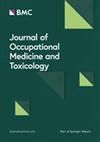缩小知识差距!非正式电子废物工人的健康状况
IF 2.7
4区 医学
Q2 PUBLIC, ENVIRONMENTAL & OCCUPATIONAL HEALTH
Journal of Occupational Medicine and Toxicology
Pub Date : 2024-04-15
DOI:10.1186/s12995-024-00410-z
引用次数: 0
摘要
虽然有几项研究分析了电子废物回收对人体健康的影响,但大多数出版物并没有区分电子废物工人和旁观者(如居民)。这可能会导致低估对工人健康的影响。此外,经常报道的替代研究结果并不能正确反映具有临床意义的健康结果。本综述旨在分析非正规电子垃圾回收对非正规电子垃圾工人健康的直接影响。根据 PRISMA 指南,我们在 3 个数据库(Embase®、PubMed®、Web of Science)中系统检索了 1980 年至 2021 年 11 月 1 日期间以德语或英语发表的中低收入国家的研究。在 2613 次点击中,有 26 项研究(横断面研究、纵向研究和病例对照研究)符合特定标准并被纳入。我们将研究结果分为非正式电子废物工人的激素、呼吸系统、肾脏、心血管、肌肉骨骼健康和一般症状。暴露于电子废物与脂质代谢改变、甲状腺激素失衡、生育能力受损、肾功能障碍、呼吸系统症状发病率增加、哮喘、心律失常、高血压、肌肉骨骼疼痛有关,高达 89% 的电子废物工人会受伤,高达 87.5-100% 的电子废物工人会出现皮肤病。由于研究结果不一致、关联性弱或研究质量差,除了受伤或皮肤病之外,很少有可能确定非正式电子废物工作与健康影响之间的因果关系。除了高质量的研究之外,还需要国家和国际社会在政治上共同关注电子废物处理问题。本文章由计算机程序翻译,如有差异,请以英文原文为准。
Bridging the knowledge gap! Health outcomes in informal e-waste workers
Although several studies analyzed the impact of e-waste recycling on human health, most publications did not differ between e-waste workers and bystanders, such as residents. This could lead to an underestimation of health effects in workers. In addition, frequently reported surrogate findings do not properly reflect clinical significant health outcomes. The aim of this review was to analyze the direct health effects of informal e-waste recycling in informal e-waste workers. According to PRISMA guidelines, we systematically searched 3 databases (Embase®, PubMed®, Web of Science) for studies from low- and middle-income countries published in German or English between 1980 and 1 November 2021. Of the 2613 hits, 26 studies (cross-sectional, longitudinal and case-control studies) met the specified criteria and were included. We categorized the results into hormonal, respiratory, renal, cardiovascular, musculoskeletal health and general symptoms in informal e-waste workers. Exposure to e-waste was associated with altered lipid metabolism, thyroid hormonal imbalances, impaired fertility, renal dysfunction, increased prevalence of respiratory symptoms, asthma, cardiac arrhythmias, hypertension, musculoskeletal pain, injuries in up to 89% and skin disorders in up to 87.5–100% of e-waste workers. Due to inconsistent findings, weak associations or poor study quality, it has rarely been possible to establish a causal relationship between informal e-waste work and health effects, except for injuries or skin conditions. Besides high-quality studies, a collective national and international political focus on e-waste disposal is needed.
求助全文
通过发布文献求助,成功后即可免费获取论文全文。
去求助
来源期刊

Journal of Occupational Medicine and Toxicology
PUBLIC, ENVIRONMENTAL & OCCUPATIONAL HEALTH-
CiteScore
6.00
自引率
0.00%
发文量
23
审稿时长
19 weeks
期刊介绍:
Aimed at clinicians and researchers, the Journal of Occupational Medicine and Toxicology is a multi-disciplinary, open access journal which publishes original research on the clinical and scientific aspects of occupational and environmental health.
With high-quality peer review and quick decision times, we welcome submissions on the diagnosis, prevention, management, and scientific analysis of occupational diseases, injuries, and disability. The journal also covers the promotion of health of workers, their families, and communities, and ranges from rehabilitation to tropical medicine and public health aspects.
 求助内容:
求助内容: 应助结果提醒方式:
应助结果提醒方式:


